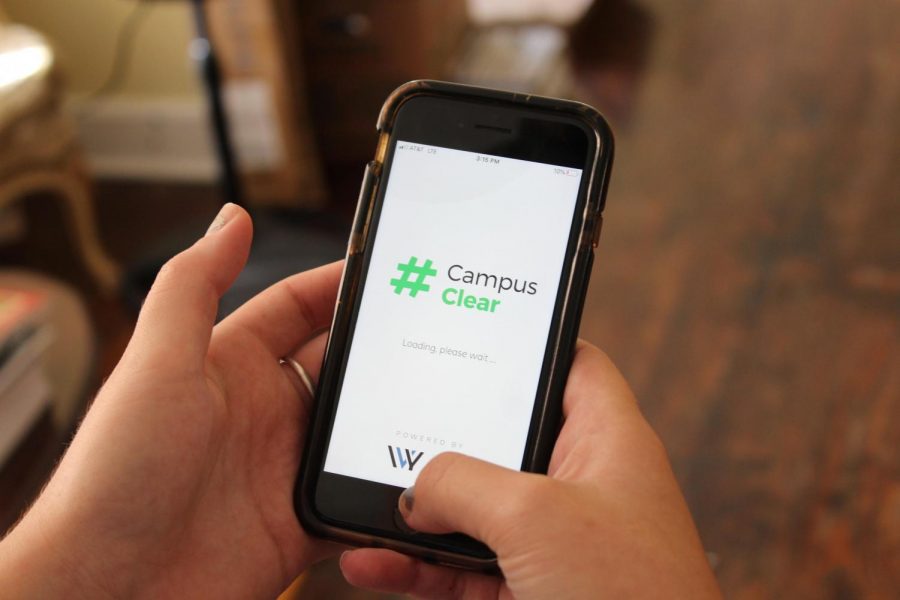Campus Clear
Eleni Fotokas, a senior, fills out her Campus Clear app before class, Friday, Sept. 11, 2020, in New Orleans, Lousiana.
September 21, 2020
Less than a few seconds is the amount of time it takes to do a screening test on the new Campus Clear app for COVID-19.
Loyola University of New Orleans is just one of the Jesuit Universities that have taken up this health screening app as a plan to ensure safety on campus.
Loyola’s back to campus plan outlines a guideline that every student and faculty member must complete a daily screening where they report COVID-19 symptoms to be clear to report to campus.
“It is one of the most powerful tools we have for our public health resources. It reminds our community to be vigilant about their own health. To be mindful from day to day how we’re feeling and to track that so we can immediately redirect someone to resources. If they think they might be sick they can go to a campus and get tested or treated. And to remember not to come to campus if they’re not feeling well,” said Rachel Hoormann, Loyola’s chief communication officer.
Loyola University is adding more campus signs for awareness about the Campus Clear app in New Orleans, Louisiana.
The Campus Clear app was created in partnership with Creighton and Stony Brook University. The two Jesuit universities collaborated with a developer called IV to produce the app according to Hoorman. Over this summer Loyola had a number of workgroups that were assembled to plan for students’ return in the fall and there was broad consensus that having an app of some kind would be useful according to Hoorman. Campus Clear is unique in the manner that it is the first app of its kind.
“It’s the only product I am aware of that was specifically created with universities and Colleges in mind. So, they understand the way that faculty and students interact. There is also no cost for the university using it,” said Hoormann.
While the app strives to report daily assessment tests for students to safely report to campus, the app also has procedures for students who are not clear. The app prompts unclear students to contact student health services, while student health services are also monitoring that information and reaching out to students along with providing resources. The app promises individual confidentiality if a student tests positive, protecting information with encryption. So in response, Loyola’s health services have been conducting contact tracing to alert other students.
The student health services would reach out to a student if they had indicated they tested positive through the app. They would check in with the student and make sure they are getting appropriate treatments and staying home safely or they’ll move them to a residence hall if necessary. Djoulissa Louis-Jean, the public health coordinator, and her team will do what’s called contact tracing according to Hoormann. They will talk to students and find out who they have been in close contact with and contact those individuals said Hoormann.
Natalie Franchise, a junior at Loyola in the communications department, is one of the students who has been using the Campus Clear app in her hybrid classes and shared some of her experiences with the app. While some students believe the app was a good idea in theory some say they don’t think students will be transparent according to Franchise.
“I do not think overall it is that effective. I don’t know. I understand why they’re not just doing positive and negative but some of the symptoms they listed out you could have from anything. Maybe you want to be honest but you don’t know. You could get a headache from anything,” said Franchise.
This is one of the few concerns that have been mentioned since the testing of the app from one of the university students. Some students say they are also not being asked to show their campus clear daily when on campus questioning its effectiveness according to Franchise.
“Look, people can be dishonest. You know what I mean? I don’t think someone will lie and say their negative, but I also don’t think someone will report their symptoms. I think they are just trying to make people feel safer, but when you think about it, students aren’t doing it daily because they aren’t going to class daily. The app works whatever, it looks sleek, basic, and gets to the point. But do I think it’s effective? No,” said Franchise.
While there are some concerns over whether the university’s faculty is checking these daily assessment tests, the administration has been trying to move in a direction where all students show their fast pass daily. This move comes after recommendations were sent to the university over the app according to Hoormann.
The university has tried to take in as much feedback as possible to continue to improve the app with students’ concerns since the app is only a few months old. The college is working closely with developers to continue to express problems and improvements that can be made. The university has been trying to refine the language in the app to be really clear since some initial concerns were the app was confusing according to Hoormann. The University has provided a link where students can report bugs or concerns to continue to improve the app, https://forms.gle/9PYxXz3wNP7g2xxg8.







